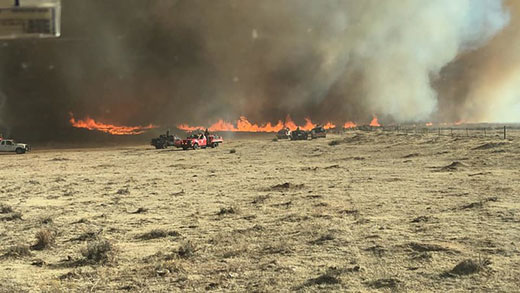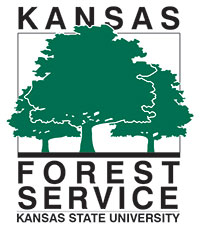
The Southwest Wildland Task Force from Kansas was requested to assist Beaver, Oklahoma on the 412 Fire. Photo credit: Southwest Wildland Task Force | Download this photo.
Kansas firefighters return home safely
Kansas Forest Service resources, Kansas firefighters return home to Kansas from the 412 Fire in Beaver County Oklahoma
March 9, 2020
MANHATTAN, Kan. – Kansas firefighters, Kansas Forest Service wildland fire personnel and Air Tanker 95 returned to Kansas Sunday evening after completing their assignment on the 412 Fire in Beaver County, Oklahoma.
“Kansans should be proud of the efforts of the firefighters who answered the request for assistance by our counterparts with Oklahoma Forestry Services,” said Mark Neely, state fire management officer with the Kansas Forest Service.
More than 70 firefighters from three groups -- the Seven Counties Wildland Task Force, Sedgwick/Sumner County Wildland Task Force and the Southwest Kansas Wildland Task Force -- joined firefighters in Oklahoma on the 412 Fire to improve control lines, conduct mop up and suppress hot spots. Many other Kansas firefighters responded to the fire through existing mutual aid requests.
According to Oklahoma Forestry Services, the 412 Fire was estimated at 29,120 acres with 50% containment as of Monday morning. Very light rain fell over the 412 Fire Monday morning in Beaver County which assisted firefighters as mop-up and patrol efforts continued.
“From past experiences, we know that the best way to protect property and lives in Kansas is to stop a wildfire before it grows to a catastrophic size,” Neely said. “By supporting Oklahoma Forestry Services through the Great Plains Interstate Fire Compact, we are accomplishing our goal to prevent and control wildfires in our region.”
Through the GPIFC, KFS was able to make resources available to Oklahoma Forestry Services, which is in the South Central Interstate Fire Compact. Both compacts are part of the Alliance of Forest Fire Compacts. Within Kansas, the Kansas Forest Service is the point of contact that can order firefighting resources from either the U.S. Forest Service or other states through the Great Plains Interstate Fire Compact.
This is the final update from KFS on activity on the 412 Fire. Follow Oklahoma Forestry Services on Facebook https://www.facebook.com/OklahomaForestry/ or check their daily situation report http://www.forestry.ok.gov/situation-reports for continued updates.
The Kansas Forest Service is the nation’s fifth oldest state forestry agency. The agency serves rural landowners, communities, rural fire districts, forest and arboriculture industries, and citizens of the state through its Conservation Tree and Shrub Planting, Fire Management, Community Forestry, Rural Forestry, Marketing and Utilization, and Forest Health programs. The Kansas Forest Service state office is located in Manhattan, Kansas, just west of the campus of Kansas State University. The Kansas Forest Service is housed as an independent agency within K-State Research and Extension. The agency receives its direction from a mission statement that reads: “Care of Natural Resources and Service to People through Forestry.”


